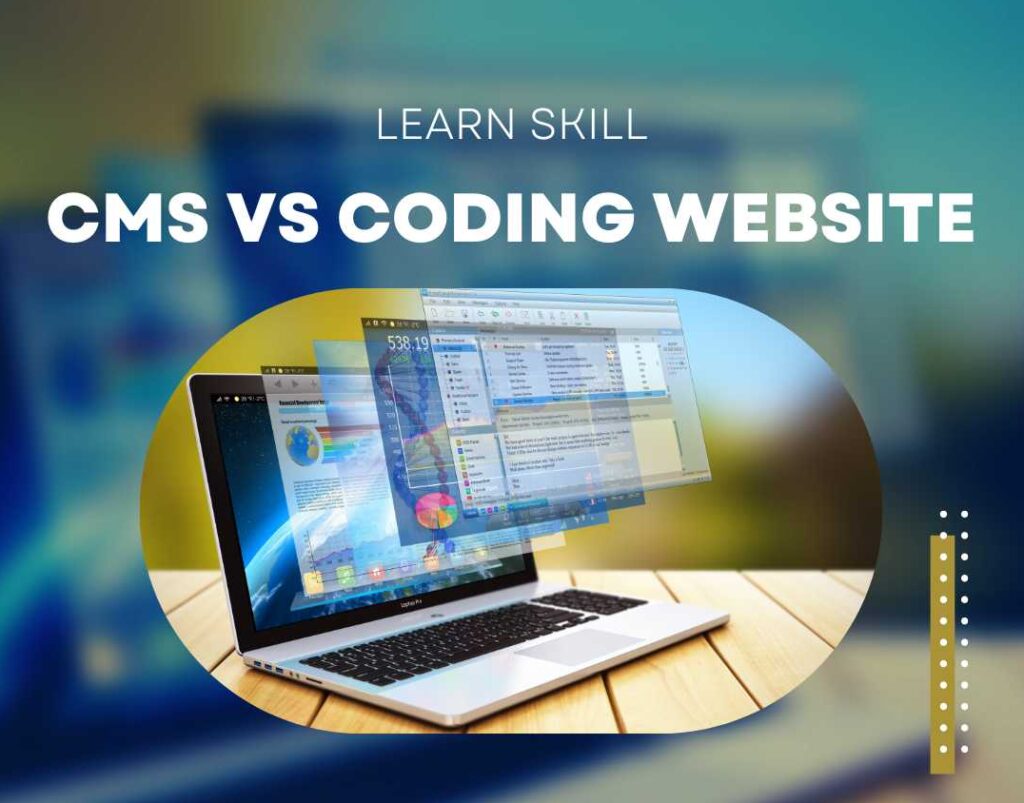COMPARISON OF CMS WEBSITE VS CODING WEBSITE
When you’re trying to decide between a custom-developed Coding Website and a CMS Website (Content Management System) website for your online store that specializes in digital downloads, there are lots of things to think about, like how easy it is to use, how much it can grow with your business, and how your customers will like it. In the discussion below, we’ll discuss the good and not-so-good things about each option based on what you need for your online store.
- Custom Coding Website
- CMS Website
Coding Website
Coding a website from scratch allows for complete customization and control over every aspect of the site’s design and functionality. This approach is ideal for those who have specific design requirements or who want to create a truly unique website. Coding a website from scratch also allows for better optimization for search engines and improved performance.
Good Side:
- Tailored Solutions: With custom coding, we can create a personalized e-commerce solution just for your digital download business. This will ensure that your customers have an amazing user experience.
- Scalability: A custom-developed site can be scaled precisely to your business growth, integrating new features and technologies as required.
- Performance Optimization: You have the power to optimize website performance, delivering lightning-fast loading times and a seamless checkout process for digital products.
Bad Side:
- Development Time and Cost: Creating a website from the ground up demands a substantial commitment of time and money. Expenses rise for intricate features or integrations.
- Maintenance: Ensure the ongoing security, functionality, and relevance of the website through consistent technical support and maintenance by skilled developers.
CMS Website [Content Management System Website]
A CMS website is a website that is built using a pre-designed template and a user-friendly interface that allows users to easily add, edit, and manage content without the need for any coding knowledge. Popular CMS platforms like WordPress, Joomla, and Drupal. One of the main advantages of using a CMS is that it is quick and easy to set up, making it ideal for those who are not familiar with coding. Additionally, CMS websites often come with a variety of plugins and extensions that can be easily added to enhance the functionality of the site.
Good Side:
- Ease of Use: CMS platforms like WordPress, Shopify, Woo Commerce, and Magento confidently offer user-friendly interfaces that empower non-technical users to efficiently manage their online stores, from adding new products to processing orders.
- Cost-Effective: Setting up an e-commerce site on a CMS platform is generally less expensive and faster than custom development. Many CMSs offer a range of pricing plans to suit different budgets.
- Built-in Features and Plugins: Most CMS platforms come with a variety of built-in e-commerce features and plugins, making it easy to add functionality such as payment gateways, product reviews, and digital product delivery.
Bad Side:
- Customization Limitations: While plugins and themes offer customization options, there may be limitations to how much you can tailor the site to your specific needs without custom development.
- Performance: Keep in mind that a CMS-based site’s loading times and performance may be slower due to the hosting and the use of multiple plugins or add-ons, as opposed to a custom-coded website.
It’s important to remember that a content management system (CMS) website can be the best option for businesses looking to quickly launch an online store for digital downloads while making a lower initial investment. Platforms like Shopify and WooCommerce offer robust e-commerce capabilities, are easy to use, and provide the flexibility to add or change products as your business grows. However, if your digital download store requires highly customized features, or if you expect rapid growth and want complete control over the website’s performance and user experience, investing in a custom-coded website might be the more strategic long-term choice. Ultimately, your decision should align with your business objectives, budget, and the amount of time you’re willing to invest in developing and maintaining your online store.



